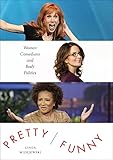Pretty/Funny : Women Comedians and Body Politics / Linda Mizejewski.
Material type: TextPublisher: Austin : University of Texas Press, [2021]Copyright date: ©2014Description: 1 online resource (278 p.)Content type:
TextPublisher: Austin : University of Texas Press, [2021]Copyright date: ©2014Description: 1 online resource (278 p.)Content type: - 9780292756922
- 792.702 8092 23
- online - DeGruyter
| Item type | Current library | Call number | URL | Status | Notes | Barcode | |
|---|---|---|---|---|---|---|---|
 eBook
eBook
|
Biblioteca "Angelicum" Pont. Univ. S.Tommaso d'Aquino Nuvola online | online - DeGruyter (Browse shelf(Opens below)) | Online access | Not for loan (Accesso limitato) | Accesso per gli utenti autorizzati / Access for authorized users | (dgr)9780292756922 |
Frontmatter -- Contents -- Acknowledgments -- Introduction. Pretty/Funny Women and Comedy’s Body Politics: Funniness, Prettiness, and Feminism -- Chapter One. Kathy Griffin and the Comedy of the D List -- Chapter two. Feminism, Postfeminism, Liz Lemonism: Picturing Tina Fey -- Chapter three. Sarah Silverman: Bedwetting, Body Comedy, and “a Mouth Full of Blood Laughs” -- Chapter four. Margaret Cho Is Beautiful: A Comedy of Manifesto -- Chapter five. “White People Are Looking at You!” Wanda Sykes’s Black Looks -- Chapter six. Ellen DeGeneres: Pretty Funny Butch as Girl Next Door -- Notes -- Bibliography -- Index
restricted access online access with authorization star
http://purl.org/coar/access_right/c_16ec
Women in comedy have traditionally been pegged as either “pretty” or “funny.” Attractive actresses with good comic timing such as Katherine Hepburn, Lucille Ball, and Julia Roberts have always gotten plum roles as the heroines of romantic comedies and television sitcoms. But fewer women who write and perform their own comedy have become stars, and, most often, they’ve been successful because they were willing to be funny-looking, from Fanny Brice and Phyllis Diller to Lily Tomlin and Carol Burnett. In this pretty-versus-funny history, women writer-comedians—no matter what they look like—have ended up on the other side of “pretty,” enabling them to make it the topic and butt of the joke, the ideal that is exposed as funny. Pretty/Funny focuses on Kathy Griffin, Tina Fey, Sarah Silverman, Margaret Cho, Wanda Sykes, and Ellen DeGeneres, the groundbreaking women comics who flout the pretty-versus-funny dynamic by targeting glamour, postfeminist girliness, the Hollywood A-list, and feminine whiteness with their wit and biting satire. Linda Mizejewski demonstrates that while these comics don’t all identify as feminists or take politically correct positions, their work on gender, sexuality, and race has a political impact. The first major study of women and humor in twenty years, Pretty/Funny makes a convincing case that women’s comedy has become a prime site for feminism to speak, talk back, and be contested in the twenty-first century.
Mode of access: Internet via World Wide Web.
In English.
Description based on online resource; title from PDF title page (publisher's Web site, viewed 26. Apr 2022)


